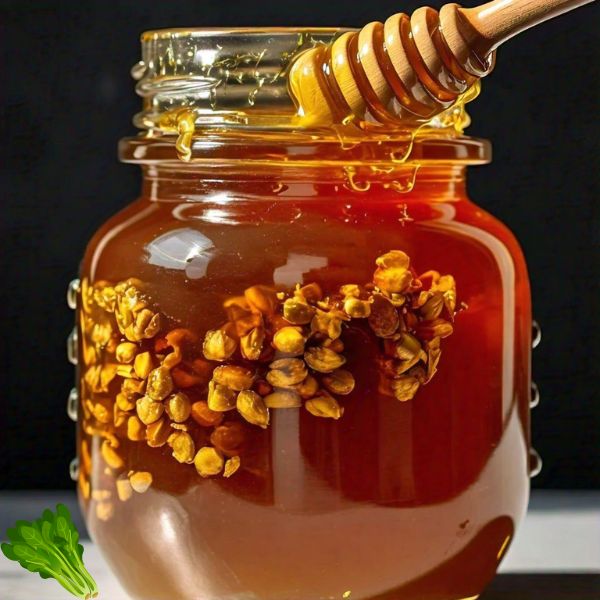Honey has long been loved for its natural sweetness, and many consider it a healthy alternative to refined sugar. But, like any sugar, honey should be consumed in moderation – especially for individuals with health conditions such as diabetes. While honey offers many potential health benefits, it is also high in calories and sugar, making it important to balance its use in a healthy diet. This article examines the nutritional benefits of honey, its possible health advantages, and important factors to consider when adding it to your diet.
Nutritional Breakdown of Honey
The nutritional profile of honey shows that it is composed primarily of carbohydrates, specifically sugars like glucose and fructose. According to the USDA, one tablespoon (about 21 grams) of honey has the following nutritional values:
- Calories: 64
- Fat: 0g
- Sodium: 0mg
- Carbohydrates: 17g
- Sugars: 17g
- Protein: 0.1g
- Potassium: 10.9mg
- Iron: 0.1mg
- Calcium: 1.3mg

Most of the calories in honey come from sugar, with each tablespoon containing about 17 grams of sugar. The glycemic index (GI) of honey is about 60, which is slightly lower than table sugar (65). The glycemic index measures how quickly a food raises blood sugar levels, making it important for individuals who need to manage their blood sugar, such as people with diabetes.
Carbohydrates in Honey
The main macronutrient found in honey is carbohydrates. It contains almost equal amounts of glucose and fructose, the two simplest forms of sugar. These carbohydrates are rapidly taken up by the body, making honey a quick source of energy. For people with diabetes, it is important to know about the glycemic load of honey, which is estimated to be about 3.5 per tablespoon.
Honey Is Fat-Free and Low in Protein
Honey contains no fat, so it’s a great option if you want to avoid fatty foods. However, honey is not a good source of protein. It contains very little protein about 0.1 grams per tablespoon-so it won’t contribute significantly to your daily protein needs.
Vitamins and Minerals in Honey
Although honey contains small amounts of vitamins and minerals, the actual amounts vary depending on its origin and processing method. Honey can include a variety of nutrients such as B vitamins, calcium, potassium, iron, and zinc, among. Darker honeys usually contain higher amounts of nutrients than lighter honeys. However, since honey is usually consumed in small quantities, these micronutrients are unlikely to make a big difference to your daily intake.
Potential Health Benefits of Honey
Many studies show that honey provides a variety of health benefits, but it is important to evaluate these in conjunction with its high sugar content. Here are some important benefits associated with honey:
Soothing Coughs
Honey is used as a natural remedy for coughs, and scientific research supports this. Research indicates that a teaspoon of honey could be just as effective as certain over-the-counter cough suppressants, including dextromethorphan, which is the active component in many cough remedies. Honey is particularly effective at calming nighttime coughs in children, providing longer-lasting relief than some medications such as diphenhydramine (Benadryl) or salbutamol (Albuterol).
Aiding Digestive Health
Honey may help with digestive problems such as irritable bowel syndrome (IBS). Research suggests that honey’s phytochemicals and flavonoids may aid digestion, although studies supporting this benefit are limited. Some animal studies indicate that raw honey may ease the stomach, reducing symptoms of diarrhea and constipation. Specifically, honey has been shown to reduce the severity and duration of viral diarrhea in animals, but these results have not yet been confirmed in humans.
Supporting Reproductive Health
Royal jelly, a type of honey produced by bees, has shown promising results in improving female reproductive health. Preliminary studies suggest it may reduce symptoms of premenstrual syndrome (PMS) and menopause. The antioxidants in royal jelly may also help combat oxidative stress, which is associated with aging in the ovaries. Some animal studies have also suggested that royal jelly may improve sperm quality, although this benefit has not been confirmed in humans.
Wound Healing
Honey, especially its propolis component, has long been used for wound healing. Propolis, which contains resins, waxes, essential oils, and pollen, has been shown to promote collagen synthesis and suppress free radicals. These properties make it useful in treating diabetic foot ulcers and acne when applied topically. Honey’s antimicrobial properties also make it beneficial for wound care.
Potential Cancer Prevention
Some preliminary research suggests that honey may have anti-cancer properties. In laboratory studies, honey has been found to induce the death of tumor cells and reduce inflammation, which is often associated with cancer development. Although these studies are promising, more research in humans is needed to confirm these findings.
Risks and Considerations
Although honey can offer several health benefits, it also comes with risks. Here are some important considerations:
- Allergies: Honey is not a common allergen, but in rare cases, it can cause severe allergic reactions, including anaphylaxis. This is more likely in individuals with allergies to bees or pollen.
- Infants and botulism: The American Academy of Pediatrics recommends not giving honey to infants under one year of age due to the risk of botulism. Honey may contain spores of Clostridium botulinum, which can cause serious illness in infants.
- Diabetes and blood sugar: If you are managing diabetes or on a low-sugar diet, it is important to limit your honey intake. Honey can raise blood sugar levels, just like other forms of sugar.
Types of Honey
There are over 300 types of honey, each with its own distinct characteristics. Popular varieties include clover, wildflower, orange blossom, buckwheat, avocado and alfalfa honey. These varieties vary in taste, color and nutrient content depending on the plants from which the bees collect nectar. Honey can also be classified as raw or pasteurized:
- Raw honey: This type of honey is unprocessed and retains most of its nutrients and enzymes. It is usually more delicious and nutritious than pasteurized honey.
- Pasteurized honey: This type undergoes a process of heating and filtering to make it smoother and more pourable. However, pasteurization can reduce some of the beneficial nutrients and enzymes in honey.
How to Use and Store Honey
Honey is a versatile sweetener that can be used as a sugar substitute in many recipes. It can be added to tea, spread on toast or used in baking. When using honey in recipes, keep in mind that it is sweeter than sugar, so you will need less. As a general rule, use 1/2 to 3/4 cup of honey for every cup of sugar in a recipe.
Also, reduce the liquids in a recipe by 1/4 cup for every cup of honey used. For storage, honey should be kept in a cool, dry place to prevent crystallization and degradation of its flavor and aroma. If stored properly in an airtight container, honey can last up to two years.
Conclusion
Honey is a natural and nutritious sweetener that offers many potential health benefits, from soothing coughs to aiding digestion and wound healing. However, it is also high in sugar and calories, so it should be consumed in moderation. By choosing raw honey and consuming it in moderation, you can enjoy its unique flavor and health benefits as part of a balanced diet.
[Read more : 7 Surprising Health Benefits of Spinach]
**************************
Frequently Asked Questions
Q1. Can honey help with weight loss?
Answer : Honey itself does not directly promote weight loss, but it can be a healthier alternative to refined sugars in your diet. It has a lower glycemic index than sugar, meaning it causes a slower, steadier rise in blood sugar levels, which may help with better energy management and reduced cravings. However, honey is still high in calories, so it should be consumed in moderation to avoid excess calorie intake, which could hinder weight loss goals.
Q2. Is honey a good remedy for sore throats and coughs?
Answer : Yes, honey is well-known for its ability to soothe sore throats and suppress coughs. Research shows that honey is as effective as, or even better than, some over-the-counter cough medicines. A spoonful of honey can coat the throat and provide relief, especially at night. Its antimicrobial properties also help fight infections, making it a popular natural remedy for coughs and colds.
Q3. Does honey improve digestion?
Answer : Honey may have a positive impact on digestive health. It contains enzymes that help break down food and aid in digestion. Some studies suggest that honey can help relieve symptoms of indigestion, such as bloating, constipation, and diarrhea. Raw honey, in particular, has prebiotic properties that may promote the growth of healthy gut bacteria, supporting overall digestive function.
Q4. Can honey boost the immune system?
Answer : Honey, especially raw and unprocessed varieties, contains antioxidants, vitamins, and minerals that may help strengthen the immune system. Its antimicrobial and anti-inflammatory properties can help the body fight off infections and reduce oxidative stress. However, while honey can support immune health, it’s not a cure-all, and its benefits are best realized as part of an overall healthy diet.
Q5. Is honey beneficial for skin and wound healing?
Answer : Yes, honey has been used for centuries for wound healing due to its antimicrobial properties. It can help cleanse wounds, prevent infection, and promote tissue regeneration. Honey, especially medical-grade honey like Manuka honey, is often used to treat minor burns, cuts, and diabetic foot ulcers. When applied topically, it creates a protective barrier and keeps the wound moist, which aids the healing process. It can also be used in skincare routines to hydrate and soothe the skin.

1 thought on “Honey : Nutritional Benefits & Health Impacts”